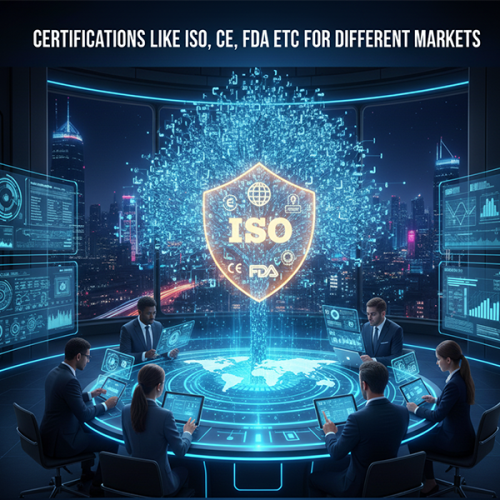
Obtaining the correct certifications is essential for suppliers exporting to different markets, as these demonstrate compliance with a country's safety, quality, and environmental regulations. Required certifications, such as ISO, CE, and FDA, vary significantly depending on the product and the target market.
Key Certifications for Different Markets
ISO (International Organization for Standardization)
ISO standards are globally recognized benchmarks for quality, safety, and efficiency. They are generally voluntary but often become mandatory for doing business with certain clients or accessing specific markets.
-
ISO 9001 (Quality Management Systems): Helps organizations deliver consistent quality products and services. It's often a prerequisite for tenders and contracts in many industries worldwide.
-
ISO 13485 (Medical Devices): A mandatory quality management standard for companies manufacturing or servicing medical devices for international markets.
-
ISO 22000 (Food Safety Management): Crucial for businesses involved in food processing, packaging, and supply, as it ensures safe food handling practices and traceability.
-
ISO 14001 (Environmental Management Systems): Helps companies manage and reduce their environmental impact, which is increasingly important for sustainable-minded markets.
CE (Conformité Européenne) Marking
The CE mark is a mandatory conformity marking for products sold within the European Economic Area (EEA), which includes the European Union, Iceland, Liechtenstein, and Norway.
-
What it means: By affixing the CE mark, the manufacturer declares that the product meets EU health, safety, and environmental protection standards.
-
How to obtain: Indian suppliers must conduct a conformity assessment, compile a technical file, and, for higher-risk products, involve an independent "Notified Body" for certification.
-
Product categories: The mark applies to products such as electronics, machinery, toys, medical devices, and personal protective equipment.
FDA (U.S. Food and Drug Administration)
The FDA regulates the import of food, drugs, medical devices, and cosmetics into the United States. Indian exporters must comply with specific FDA regulations and registration requirements.
-
Food products: Facilities handling food for the U.S. market must register with the FDA. Indian exporters must also comply with the Foreign Supplier Verification Programs (FSVP) and provide prior notice of shipments.
-
Medical devices: All medical devices require FDA clearance or approval. Indian manufacturers must register their facilities and list their products, following specific class-based requirements and quality system regulations.
-
Pharmaceuticals: Drugs must meet FDA safety and efficacy standards. Exporters need FDA establishment registration, drug listing, and often a Certificate of Pharmaceutical Product (CoPP).

krishna
Krishna is an experienced B2B blogger specializing in creating insightful and engaging content for businesses. With a keen understanding of industry trends and a talent for translating complex concepts into relatable narratives, Krishna helps companies build their brand, connect with their audience, and drive growth through compelling storytelling and strategic communication.